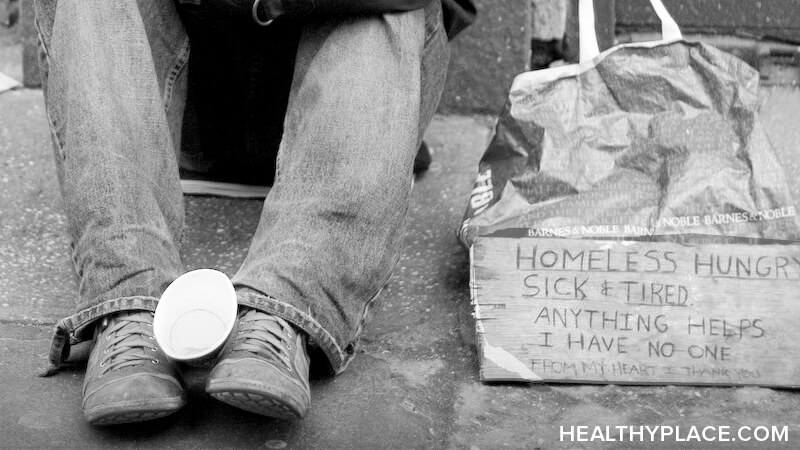Mental Illness and Homelessness

Mental illness and homelessness can be interrelated. In "The Homeless Mentally Ill," an article appearing in the Harvard Mental Health Letter (2005), the author asserts that nearly a third of all homeless people in the U.S. have a serious mental illness like schizophrenia, bipolar disorder, or major depression. This means that of the estimated 600,000 homeless people in the U.S. in 2005, approximately 200,000 were seriously mentally ill. The mentally ill homeless numbered nearly a quarter million people.
Homelessness and Mental Illness: Does One Cause the Other?
The association between mental illness and homelessness isn't quite a cause-and-effect relationship. There are so many factors at work in both mental illness and homelessness, not to mention the two of them together, to say that one unequivocally causes the other.
There most definitely is a relationship between mental illness and homelessness, though, and each one does contribute to the other in a circular fashion. Without help, the mutual contribution can spin out of control.
Mental illness can contribute to homelessness when symptoms become so severe that the person can't function. For example, he or she might be so disorganized as to be unable to maintain a job (and thus pay rent or make house payments). Also, specific symptoms of mental health disorders, such as the manic state of bipolar disorder or the psychotic symptoms and paranoia of schizophrenia (paranoia, though, isn't always present in schizophrenia) can not only make it hard to work or care for oneself but can also severely isolate the person when others don't know what to do.
Homelessness can contribute to mental illness because of the severe distress caused by living on the streets. Homelessness is traumatic, and as such can lead to PTSD. Depression, too, often develops when people live on the streets, as can other mental illnesses. If someone is vulnerable to mental illness, either from environmental or genetic factors, homelessness is very likely to lead to mental illness (What Causes Mental Illness? Genetics, Environment, Risk Factors).
Mental Illness and Homelessness: A Link
The interconnection between homelessness and mental illness is multifaceted. Many different factors contribute to both of them, and they reflect the circular cause-and-effect relationship between the two.
- Biological risk factors increase the likelihood of both mental illness and subsequent homelessness.
- Stressors and triggers such as significant loss, experiencing trauma, abuse, and others greatly reduce someone's ability to function and increase the risk of homelessness.
- effects of child abuse (physical, emotional, sexual as well as neglect) that carry into adulthood substance use
- psychiatric hospitalizations
- clashes with the law and time in jail
- little or no access to support systems (mental health care, social support, family support, etc.)
- isolation due to prejudices, misunderstandings, and mistreatment (Mental Illness Myths And The Damage They Cause)
- government policies and insurance policies that make accessing mental health care difficult for many and impossible for some; without help and treatment, mental illness symptoms worsen and the risk of homelessness further increases.
While each of these contributing factors can lead to or exacerbate existing mental illness as well as result in homelessness, it's unlikely that any single item will create mental illness and/or homelessness. Instead, it's the interplay of all, or at least several, of them that plays a part in the development of both mental illness and homelessness.
Support for Mentally Ill Homeless
Despite the fact that it can be difficult to access, there is help available because homelessness and mental illness shouldn't have to coexist.
- outreach: in many cities, organizations have people who hit the streets and meet the homeless where they are, and they provide information to help connect the mentally ill homeless to resources
- social security provided by the government (this requires an address, and some shelters allow people to pick up their mail there, the post office may allow homeless individuals to pick up mail there, or the homeless person may use the address of someone they know)
- shelters
- temporary housing; the Department of Housing and Urban Development has a list of online resources by state to help people locate temporary housing agencies.
The key to ending the cycle of mental illness and homelessness is treatment for mental illness (How to Find Mental Health Services in Your Area). Without treatment and support, people with mental illness won't be able to remain in housing once they receive it. Not just that, but like all human beings, the homeless mentally ill deserve to have their basic needs met, and beyond that, create wellbeing.
APA Reference
Peterson, T.
(2019, September 30). Mental Illness and Homelessness, HealthyPlace. Retrieved
on 2024, November 20 from https://www.healthyplace.com/other-info/mental-illness-overview/mental-illness-and-homelessness



